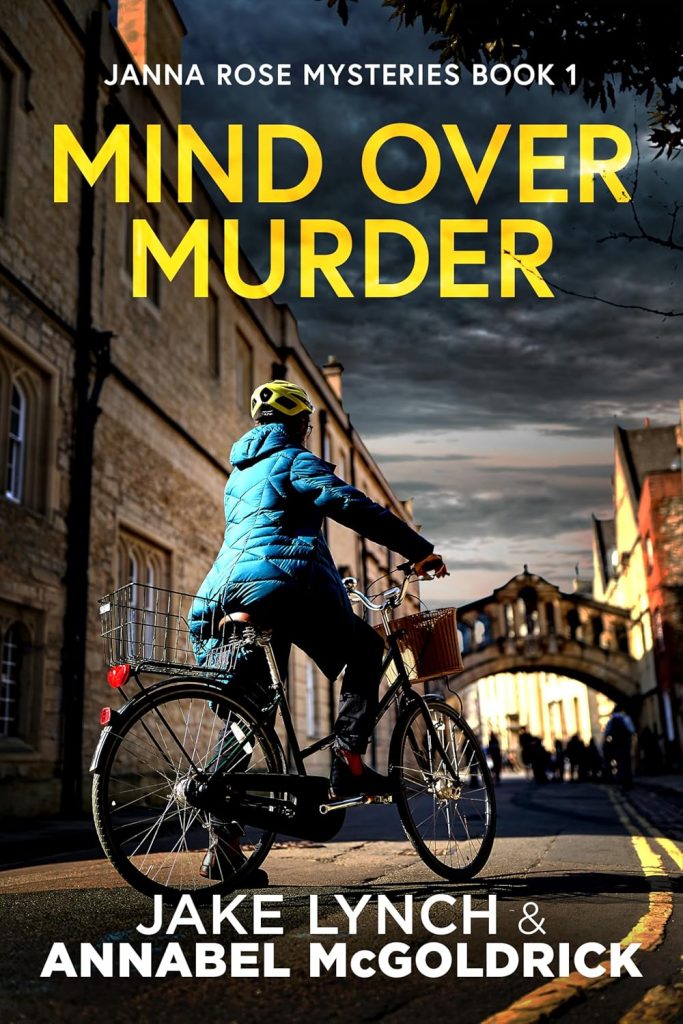
Find books by Jake Lynch
on table number 42
at the summer
Oxford Indie Book Fair
on 13-July 2025
See home page for details, map and more.
It all started with a country walk. From Wytham, a treasurable unspoilt woodland with views of Oxford’s dreaming spires, we gazed into the blue sky (or down at the bluebells), then looked at each other in wild surmise. Why not?
Why not cast a character at the centre of a contemporary thriller who practises EMDR – Eye Movement Desensitisation and Reprocessing? A powerful technique for treating unprocessed trauma, now attaining zeitgeist status since Prince Harry used it when coping with the death of his mother, Princess Diana. And one that requires a fair amount of detective work in its own right, figuring out with clients the real reasons for their uncomfortable feelings and unwanted responses.
Over to Annabel, then, to supply the expertise, including poignant (and sometimes humorous) composite case studies, suitably adapted and anonymised from two decades of clinical experience. Our heroine, Janna Rose, must decipher clues from her Oxford consulting room as she struggles to unravel a mystery and expose a conspiracy, while saving herself and her dear ones from deadly peril.
As well as the agreeable sylvan setting, the very rhythm of walking, left-right-left-right, must surely help with creative inspiration. Indeed, alternate stimulation of the brain’s twin hemispheres is at the centre of the EMDR method itself – whether administered through ‘butterfly hugs,’ tapping on one’s own shoulders; or in response to a therapist, who might waggle two fingers or supply hand-held buzzers to deliver electronic pulses.
So if the character could be Janna – an amalgam of our two names – and Annabel was to provide her healing vocation, what was left for Jake? Penchant for sausage rolls – check. When catching breath after an emergency dash through the city by bike, she glugs from a cold-water tap – check again. Little things…
A former journalist, like both of us, Janna puts her media skills to good use, freelancing as a communications consultant to her landlord and neighbour, a prominent local councillor. The novel’s climax is narrated partly through news coverage from the court, as the perp goes on trial. So plenty of the atmospherics in Mind Over Murder come from our joint comfort zone.
After meeting as reporters in regional ITV, we soon gravitated to London, where Jake worked as a Political Correspondent for Sky News (and later a BBC World newsreader) while Annabel produced Against the War, a documentary presented by the playwright, Harold Pinter.
So we were on the spot to meet an eminent professor, Johan Galtung, then unveiling his concept of Peace Journalism. Which we took up, explored and promoted through conferences, courses, training modules delivered around the world as media development aid, and later in scholarly research.
As Annabel switched track into therapy, Jake took up an academic post at Sydney University, and we began dividing our time between Britain and Australia. One major funded project took us together to such farflung locations as South Africa, Mexico and the Philippines in search of experimental data – audience responses to differently framed versions of television news about conflict.
We had to produce high-quality work in a hurry and leave with useable results. Chief resource? Each other. Layers of teamwork and mutual reliance built gradually over many years.
So we came to recognise each other’s strengths and weaknesses, including as writers. Jake would attack a computer keyboard till steam rose from his ears – then Annabel would point out where readers might peel off in search of simpler answers. The adjusted texts of our jointly authored books and articles would reflect that balance of approaches.
One of the models for Mind Over Murder came in the sassy first-person narratives of Kinsey Millhone, the PI created by the late, great Sue Grafton for her Alphabet Murder series set in 1980s California. Natural and straightforward for a woman writer to adopt the persona of a female character, of course; somewhat less so, perhaps, for a husband-and-wife team. Dietary preferences were just one point at issue. Still, Kinsey is famously fond of a quarter-pounder with cheese and fries. So y’never know.
Oxford, where we first came to live a quarter of a century ago, tussles with a recurring set of familiar controversies, stemming from its small size as a medieval city, in a rural county, where space for expansion is constrained by green belt and floodplain. At the same time, its world-famous brainpower marks it out as an engine of economic growth.
So there are always development pressures, with disagreements now sharpened by insertion into wider culture war themes via social media. That seemed a promising milieu for the tensions simmering within a murder mystery plot. Then, the Oxford community – town, not gown – presents a pleasingly gritty backdrop, as many previous fictional detectives have shown.
In the Acknowledgments, Mind Over Murder is dedicated to the global EMDR psychotherapy profession, “for the vital work of helping clients to process unaddressed trauma, to prevent and minimise harm to themselves and others.” To which we should add, it’s intended as a tribute to our city, with its great variegation of characters and backgrounds, as well as to each other. And, of course, as a riveting read!

